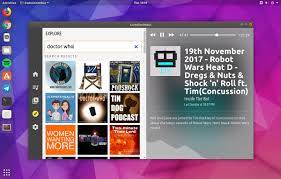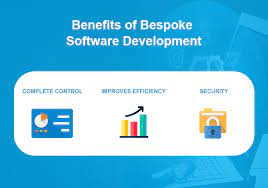Exploring the World of Linux Application Development
The World of Linux Application Development
Linux, an open-source operating system, has been a favorite among developers for its flexibility, security, and customization options. When it comes to application development on Linux, there are a plethora of tools and resources available to create robust and efficient software solutions.
Benefits of Linux for Application Development
Developers choose Linux for application development due to various reasons:
- Open-Source Nature: Linux’s open-source nature allows developers to access the source code, modify it, and contribute to the community.
- Stability and Security: Linux is known for its stability and security features, making it a reliable platform for developing secure applications.
- Compatibility: Linux supports a wide range of programming languages and frameworks, making it versatile for developers with different preferences.
- Cost-Effective: As an open-source platform, Linux is cost-effective compared to proprietary operating systems.
Tools for Linux Application Development
Several tools are popular among developers for creating applications on the Linux platform:
- GCC (GNU Compiler Collection): A powerful compiler that supports various programming languages like C, C++, and Fortran.
- Eclipse: An integrated development environment (IDE) that offers features for code editing, debugging, and version control integration.
- Vim: A highly configurable text editor favored by many developers for its efficiency and extensibility.
- Docker: A containerization platform that simplifies application deployment by packaging software into containers.
The Future of Linux Application Development
The future of Linux application development looks promising with continuous advancements in technology. With the rise of cloud computing, Internet of Things (IoT), artificial intelligence (AI), and machine learning (ML), developers have ample opportunities to innovate using Linux as their preferred development environment.
In conclusion, Linux provides a robust foundation for creating diverse applications across various industries. Its open nature fosters collaboration and innovation among developers worldwide. Whether you are a seasoned developer or just starting your journey in application development, exploring Linux as your platform can lead to exciting possibilities and rewarding outcomes.
8 Advantages of Linux Application Development: Customization, Stability, and More
- Open-source nature allows access to source code for customization.
- Stability and security features make Linux a reliable platform.
- Wide compatibility with various programming languages and frameworks.
- Cost-effective compared to proprietary operating systems.
- Vast community support for troubleshooting and collaboration.
- Efficient performance even on older hardware configurations.
- Extensive library of development tools and software packages.
- Seamless integration with cloud computing technologies.
7 Challenges of Linux Application Development: Overcoming Common Hurdles
- Limited Support for Commercial Software
- Fragmentation Across Different Distributions
- Hardware Compatibility Challenges
- Steep Learning Curve for Beginners
- Less User-Friendly Interface for Non-Tech Users
- Potential Dependency Management Issues
- Varied Documentation Quality
Open-source nature allows access to source code for customization.
One significant advantage of Linux application development is its open-source nature, which grants developers access to the source code for customization. This transparency enables developers to tailor software solutions to meet specific requirements, enhance functionality, and address unique challenges. By being able to modify and contribute to the source code, developers have the freedom to innovate and create tailored applications that align perfectly with their project goals. The open-source philosophy of Linux fosters collaboration and empowers developers to build efficient, secure, and personalized software solutions that cater to diverse needs in the ever-evolving tech landscape.
Stability and security features make Linux a reliable platform.
The inherent stability and robust security features of Linux make it a highly reliable platform for application development. Developers trust Linux for its ability to provide a secure environment that minimizes vulnerabilities and ensures the integrity of their software solutions. The consistent performance and resilience of Linux contribute to a dependable development environment, allowing developers to focus on creating innovative applications without compromising on stability or security.
Wide compatibility with various programming languages and frameworks.
One significant advantage of Linux application development is its wide compatibility with a diverse range of programming languages and frameworks. Developers have the flexibility to choose from popular languages like C, C++, Python, Java, and more, along with frameworks such as Qt, GTK, and Electron. This broad compatibility enables developers to work with their preferred tools and technologies, making Linux a versatile platform for creating software solutions tailored to specific needs and preferences.
Cost-effective compared to proprietary operating systems.
One significant advantage of Linux application development is its cost-effectiveness compared to proprietary operating systems. Since Linux is an open-source platform, developers can access and utilize it without incurring high licensing fees associated with proprietary operating systems. This cost-saving benefit enables developers to allocate resources more efficiently, invest in enhancing their applications, and reach a broader audience without financial constraints. Ultimately, the affordability of Linux as a development environment contributes to fostering innovation and creativity within the software development community.
Vast community support for troubleshooting and collaboration.
One significant advantage of Linux application development is the vast community support available for troubleshooting and collaboration. The active and diverse community of Linux users and developers worldwide offers a wealth of resources, forums, and online communities where individuals can seek help, share knowledge, and collaborate on projects. This extensive network not only facilitates quick resolution of technical issues but also promotes knowledge sharing and fosters a culture of innovation within the Linux development ecosystem. Developers can benefit greatly from this supportive community environment, making Linux an ideal platform for those looking to engage with like-minded individuals and enhance their skills through collective learning and problem-solving efforts.
Efficient performance even on older hardware configurations.
One significant advantage of Linux application development is its efficient performance, even on older hardware configurations. Linux’s lightweight design and optimized resource utilization allow it to run smoothly on older machines, maximizing their potential and extending their usability. This capability not only benefits users with older hardware but also contributes to reducing electronic waste by giving new life to aging devices. Developers can leverage Linux’s efficiency to create applications that deliver a seamless user experience across a wide range of hardware setups, making it a versatile choice for software development projects aimed at diverse audiences.
Extensive library of development tools and software packages.
One significant advantage of Linux application development is its extensive library of development tools and software packages. Developers have access to a wide range of resources that can streamline the development process, enhance productivity, and facilitate the creation of high-quality applications. Whether it’s compilers, debuggers, libraries, or other essential tools, the vast selection available on Linux ensures that developers can find the right solutions to meet their specific needs and requirements. This rich ecosystem of development tools and software packages contributes to the efficiency and effectiveness of Linux as a preferred platform for application development.
Seamless integration with cloud computing technologies.
Linux application development offers the significant advantage of seamless integration with cloud computing technologies. With Linux as the underlying operating system, developers can easily deploy and manage applications on cloud platforms like AWS, Google Cloud, and Azure. The compatibility of Linux with cloud services enables developers to leverage scalable resources, automate deployment processes, and build resilient applications that can adapt to dynamic cloud environments. This seamless integration empowers developers to take full advantage of the benefits of cloud computing while utilizing the robust capabilities of Linux for efficient and effective application development.
Limited Support for Commercial Software
One significant con of Linux application development is the limited support for commercial software. While Linux offers a vast array of open-source tools and applications, some proprietary software may not have native compatibility with the operating system. This can pose challenges for developers who rely on specific commercial software packages that are not readily available or optimized for Linux. As a result, developers may encounter difficulties in integrating certain third-party applications seamlessly into their Linux-based development environment, potentially impacting productivity and workflow efficiency.
Fragmentation Across Different Distributions
One notable con of Linux application development is the fragmentation that exists across different distributions. With numerous Linux distributions available, each with its own set of libraries, package managers, and system configurations, developers often face challenges in ensuring their applications run smoothly on all platforms. This fragmentation can lead to compatibility issues, requiring extra effort to optimize and test applications for various distributions, ultimately increasing development time and complexity. Developers must carefully consider compatibility factors and implement strategies to address fragmentation when targeting a wide range of Linux distributions for their applications.
Hardware Compatibility Challenges
One significant challenge in Linux application development is the issue of hardware compatibility. Due to the diverse range of hardware components available in the market, ensuring that an application developed on Linux runs smoothly across all devices can be a daunting task. Developers may encounter difficulties in optimizing their software to work seamlessly with various hardware configurations, leading to potential performance issues or functionality limitations. Addressing hardware compatibility challenges requires thorough testing, meticulous debugging, and continuous updates to ensure that the application can effectively interact with different hardware setups while maintaining optimal performance and user experience.
Steep Learning Curve for Beginners
One significant con of Linux application development is the steep learning curve it presents for beginners. Due to its highly customizable nature and command-line interface, newcomers to Linux development may find it challenging to grasp the intricacies of the operating system and the various tools and commands required for software development. The abundance of options and configurations available on Linux can be overwhelming for those unfamiliar with the environment, leading to a longer onboarding process and potentially hindering the initial progress of novice developers.
Less User-Friendly Interface for Non-Tech Users
One notable con of Linux application development is its less user-friendly interface for non-tech users. Unlike some other operating systems that prioritize simplicity and ease of use, Linux can be more challenging for individuals who are not familiar with technical terms and processes. Navigating the system settings, installing software, and troubleshooting issues may require a certain level of technical knowledge, which can be a barrier for those who prefer a more intuitive user experience. This complexity in the user interface aspect of Linux may deter some non-tech users from fully embracing the platform for application development.
Potential Dependency Management Issues
One significant challenge in Linux application development is the potential for dependency management issues. Due to the diverse range of libraries, packages, and versions available in the Linux ecosystem, developers may encounter difficulties in ensuring that all dependencies are correctly installed and compatible with their application. This can lead to compatibility issues, version conflicts, and time-consuming troubleshooting efforts to resolve dependency-related errors. Effective dependency management strategies and tools are essential to mitigate these challenges and streamline the development process on the Linux platform.
Varied Documentation Quality
One notable con of Linux application development is the varied quality of documentation available. While Linux offers a vast array of resources and documentation to support developers, the quality and consistency of these materials can vary widely. This inconsistency in documentation quality can pose a challenge for developers, especially those who rely heavily on clear and comprehensive guides to navigate the intricacies of the Linux environment. Navigating through disparate levels of documentation quality may lead to confusion, inefficiencies, and potential roadblocks in the development process, requiring developers to invest additional time and effort in seeking out reliable information and troubleshooting solutions.






